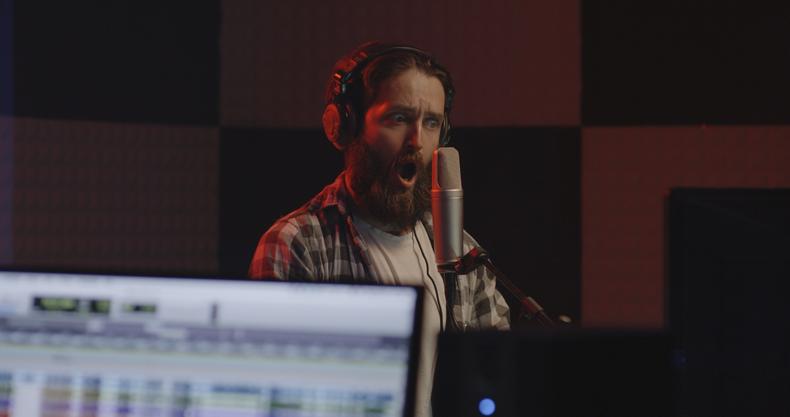
Whether you hope to become the next voice of a blockbuster game protagonist or provide a few sound bites to the latest indie title, understanding the compensation landscape is essential to becoming a video game voice actor. Pay for video game voice acting work is impacted by various factors including union membership, experience, and the specific game and company.
JUMP TO

Frame Stock Footage/Shutterstock
Those providing their instrument to video games may get paid hourly or per project, and they sometimes earn royalties and bonuses.
- Hourly rates: The pay structure for video game voice actors often uses an hourly basis. Newcomers in the industry might expect to make anywhere from $100 to $250 per hour, while union members may follow a day player minimum wage schedule ranging from approximately $450 to $2,000 per day.
- Per-project rates: If you’re wondering how much voice actors make per game, the answer is usually between $300 for smaller roles to upwards of $10,000 for lead roles in bigger games. This wide range depends heavily on the game’s budget and the depth of the role.
- Royalties and bonuses: Currently, most voice actors for video games do not earn residuals, although some may receive royalties or bonuses based on game sales or specific performance milestones. This mode of compensation has been a topic of discussion and negotiation in recent years, particularly among union actors.

“The Last of Us” behind the scenes Courtesy PlayStation
Like other types of voice actor rates, earnings for performers who lend their tool to video games are impacted by union status, experience, and the role and project itself.
Union membership
SAG represents voice actors, so union membership can impact the rates a voice actor can command. Union rates are generally higher and come with added benefits, such as health care and retirement plans. SAG is currently trying to negotiate better terms for its Interactive Media Agreement, and members recently voted to authorize a strike.
As union members advocate for better compensation, transparent contracts, and safer working conditions, many major gaming productions will be halted or delayed. For newcomers and early-career actors, this can be a double-edged sword. On one hand, the action may lead to better industry standards, making voice acting a more sustainable and lucrative career in the long run. On the other hand, the immediate impact means fewer opportunities as projects get postponed. This underscores the importance of understanding the broader industry dynamics, as collective actions can shape individual career paths in profound ways.
Experience
Like many professions, experience plays a crucial role in determining rates. A voice actor with several successful titles under their belt or who has become known in the industry can command higher rates than someone just starting out.
Scope and depth of role
A lead character with numerous lines and appearances in the game will typically yield higher compensation than a minor character with just a few lines. If you’re voicing the protagonist of a major release, you can expect a heftier paycheck than if you’re voicing a side character.
For example, Hellena Taylor was offered $15,000 to continue portraying Bayonetta for PlatinumGames and Nintendo’s “Bayonetta 3”—an offer she rejected as being too low—while a voice actor who worked on multiple AAA titles told IGN that she got paid under $4,000 for portraying a supporting character. “I had like three sessions, and it was a union game,” she said. “It was a lot of work. It was ‘efforts,’ which is getting hit, attacking, and all that. [It was] the story mode, the arcade mode, and it was a lot of work. And I’m a supporting character, I’m not even a main character.”
Motion capture (mo-cap)
Increasingly, voice actors are also being tapped to perform motion capture for characters. This physical performance often goes hand in hand with voicing the character, and it generally warrants additional compensation due to the extra skills and physical exertion required.
Game budget and developer size
Larger developers with substantial budgets are more likely to offer higher compensation rates, while indie developers might have tighter budget constraints. This doesn’t mean indie games aren’t lucrative; sometimes, they offer profit-sharing models or royalties that could result in substantial payouts if the game performs well.

aijiro/Shutterstock
As you embark on your video game voice acting journey, it’s essential to understand that your initial projects might not be incredibly lucrative.
Supplement your income
Many actors supplement their video game work with other voiceover roles in commercials, animation, or audiobooks.
Network
Networking is a cornerstone of growth in this industry. Attend industry events, conventions, and workshops to meet developers, other actors, and agents. Building these relationships can open doors to more significant opportunities and help you negotiate better rates.
Join SAG
Consider joining SAG if you’re serious about pursuing this as a long-term career. While there’s an upfront cost and yearly dues, the benefits and higher rates can make it a worthy investment.
Understand contracts
When presented with a contract, it’s vital to understand every aspect of the agreement. Look out for:
- Duration of the project: How many hours or sessions are expected of you?
- Usage: Where and how will your voice be used? Is it just for the game, or are there promotional materials involved?
- Exclusivity: Does the contract prevent you from taking on other roles, especially within the same game genre or series?
- Royalties: Are there any clauses for bonuses or profit-sharing based on game sales?
It’s always a good idea to have an attorney or agent well-versed in entertainment contracts review any agreement before signing.
So, whether you’re voicing an elven warrior in a fantasy realm or a gritty detective in a futuristic city, understand your worth, negotiate wisely, and immerse yourself in the captivating universe of video game voiceovers. Your voice has power, and it’s time for the gaming world to hear it.
 ‘Spider-Man’ Voice Actor Yuri Lowenthal on How to Break Into Video Games
‘Spider-Man’ Voice Actor Yuri Lowenthal on How to Break Into Video Games 


















